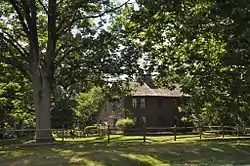Clark Homestead
The Clark Homestead is a historic house on Madley Road in Lebanon, Connecticut. Built c. 1708, it is believed to be Lebanon's oldest building. It was owned in the late 18th century by James Clark, a veteran of the American Revolutionary War.[2] The house was listed on the National Register of Historic Places on December 1, 1978.[1]
Clark Homestead | |
 | |
  | |
| Location | Madley Rd., Lebanon, Connecticut |
|---|---|
| Coordinates | 41°37′34″N 72°12′54″W |
| Area | 5 acres (2.0 ha) |
| Built | 1708 |
| Architect | Clark, Moses |
| Architectural style | Colonial |
| NRHP reference No. | 78002875[1] |
| Added to NRHP | December 1, 1978 |
Description and history
The Clark Homestead is located about 1 mile (1.6 km) south of the village center of Lebanon, on 5 rural acres at the junction of Madley and Goshen Hill Roads. It is a 2+1⁄2-story wood-frame structure, five bays wide, with a side-gable roof, large central chimney, clapboarded exterior, and rear leanto section giving it a classic New England saltbox appearance. An ell, added in the 19th century, extends to the rear. The entrance is at the center of the front facade, with a seven-light transom window and architrave above. The interior follows a typical central chimney plan, with a narrow winding staircase in the entry vestibule and parlor spaces to either side. The north bedroom in particular has a fine fireplace surround with fluted pilasters.[2]
The land the house stands on is a remnant of 100 acres (40 ha) purchased in 1700 by Daniel Clark. His grandson Moses was given the land in 1708, and built the oldest portion of this house soon afterward. That portion included the central chimney and three bays; it was widened and extended about 1750, probably by Moses's son James, making it five bays wide and adding the leanto. James Clark was a veteran of the American Revolutionary War, serving at the Battle of Bunker Hill, Battle of White Plains, and other engagements. He lived to the age of 95, and attended the dedication of the Bunker Hill Monument.[2]
See also
References
- "National Register Information System". National Register of Historic Places. National Park Service. March 13, 2009.
- "NRHP nomination for Clark Homestead". National Park Service. Retrieved 2015-01-21.